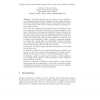Free Online Productivity Tools
i2Speak
i2Symbol
i2OCR
iTex2Img
iWeb2Print
iWeb2Shot
i2Type
iPdf2Split
iPdf2Merge
i2Bopomofo
i2Arabic
i2Style
i2Image
i2PDF
iLatex2Rtf
Sci2ools
129
click to vote
DAGSTUHL
1996
1996
A Uniform Approach for Compile-Time and Run-Time Specialization
As partial evaluation gets more mature, it is now possible to use this program transformation technique to tackle realistic languages and real-size application programs. However, this evolution raises a number of critical issues that need to be addressed before the approach becomes truly practical. First of all, most existing partial evaluators have been developed based on the assumption that they could process any kind of application program. This attempt to develop universal partial evaluators does not address some critical needs of real-size application programs. Furthermore, as partial evaluators treat richer and richer languages, their size and complexity increase drastically. This increasing complexity revealed the need to enhance design principles. Finally, exclusively specializing programs at compile time seriously limits the applicability of partial evaluation since a large class of invariants in real-size programs are not known until run time and therefore cannot be taken int...
| Added | 02 Nov 2010 |
| Updated | 02 Nov 2010 |
| Type | Conference |
| Year | 1996 |
| Where | DAGSTUHL |
| Authors | Charles Consel, Luke Hornof, François Noël, Jacques Noyé, Nicolae Volansche |
Comments (0)

